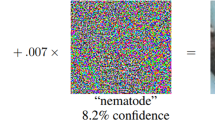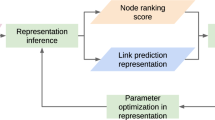Abstract
Network Embedding is an effective and widely used method for extracting graph features automatically in recent years. To handle the widely existed large-scale networks, most of the existing scalable methods, e.g., DeepWalk, LINE and node2vec, resort to the negative sampling objective so as to alleviate the expensive computation. Though effective at large, this strategy can easily generate false, thus low-quality, negative samples due to the trivial noise generation process which is usually a simple variant of the unigram distribution. In this paper, we propose a Ranking Network Embedding (RNE) framework to leverage the ranking strategy to achieve scalability and quality simultaneously. RNE can explicitly encode node similarity ranking information into the embedding vectors, of which we provide two ranking strategies, vanilla and adversarial, respectively. The vanilla strategy modifies the uniform negative sampling method with a consideration of edge existance. The adversarial strategy unifies the triplet sampling phase and the learning phase of the model with the framework of Generative Adversarial Networks. Through adversarial training, the triplet sampling quality can be improved thanks to a softmax generator which constructs hard negatives for a given target. The effectiveness of our RNE framework is empirically evaluated on a variety of real-world networks with multiple network analysis tasks.
Access this chapter
Tax calculation will be finalised at checkout
Purchases are for personal use only
Similar content being viewed by others
References
Perozzi, B., Al-Rfou, R., Skiena, S.: DeepWalk: online learning of social representations. In: KDD, pp. 701–710 (2014)
Tang, J., Qu, M., Wang, M., Zhang, M., Yan, J., Mei, Q.: LINE: large-scale information network embedding. In: WWW, pp. 1067–1077 (2015)
Cao, S., Lu, W., Xu, Q.: Grarep: learning graph representations with global structural information. In: CIKM, pp. 891–900 (2015)
Cox, T.F., Cox, M.A. (eds.): Multidimensional Scaling. CRC Press, Boca Raton (2000)
Tenenbaum, J.B., de Silva, V., Langford, J.C.: A global geometric framework for nonlinear dimensionality reduction. Science 290, 2319–2323 (2000)
Roweis, S.T., Saul, L.K.: Nonlinear dimensionality reduction by locally linear embedding. Science 290, 2323–2326 (2000)
Grover, A., Leskovec, J.: node2vec: Scalable feature learning for networks. In: KDD, pp. 855–864 (2016)
Mikolov, T., Sutskever, I., Chen, K., Corrado, G.S., Dean, J.: Distributed representations of words and phrases and their compositionality. In: NIPS, pp. 3111–3119 (2013)
Gutmann, M., Hyvärinen, A.: Noise-contrastive estimation of unnormalized statistical models, with applications to natural image statistics. J. Mach. Learn. Res. 13, 307–361 (2012)
Goodfellow, I.J., et al.: Generative adversarial nets. In: NIPS, pp. 2672–2680 (2014)
Duran, A.G., Niepert, M.: Learning graph representations with embedding propagation. In: NIPS, pp. 5125–5136 (2017)
Dai, Q., Li, Q., Tang, J., Wang, D.: Adversarial network embedding. In: AAAI (2018)
Wang, H., et al.: Graph representation learning with generative adversarial nets. In: AAAI, Graphgan (2018)
Bordes, A., Usunier, N., Garcia-Duran, A., Weston, J., Yakhnenko, O.: Translating embeddings for modeling multi-relational data. In: NIPS (2013)
Wang, P., Li, S., Pan, R.: Incorporating GAN for negative sampling in knowledge representation learning. In: AAAI (2018)
Cai, L., Wang, W.Y.: KBGAN: adversarial learning for knowledge graph embeddings. CoRR, abs/1711.04071 (2017)
Schroff, F., Kalenichenko, D., Philbin, J.: FaceNet: a unified embedding for face recognition and clustering. In: CVPR, pp. 815–823 (2015)
Yang, Z., Cohen, W.W., Salakhutdinov, R.: Revisiting semi-supervised learning with graph embeddings. In: ICML, pp. 40–48 (2016)
Schulman, J., Heess, N., Weber, T., Abbeel, P.: Gradient estimation using stochastic computation graphs. In: NIPS, pp. 3528–3536 (2015)
Yu, L., Zhang, W., Wang, J., Yu, Y.: SeqGAN: sequence generative adversarial nets with policy gradient. In: AAAI, pp. 2852–2858 (2017)
Sutton, R.S., Mcallester, D., Singh, S., Mansour, Y.: Policy gradient methods for reinforcement learning with function approximation. In: NIPS, pp. 1057–1063. MIT Press (2000)
McCallum, A., Nigam, K., Rennie, J., Seymore, K.: Automating the construction of internet portals with machine learning. Inf. Retr. 3(2), 127–163 (2000)
Tang, J., Zhang, J., Yao, L., Li, J., Zhang, L., Su, Z.: ArnetMiner: extraction and mining of academic social networks. In: KDD, pp. 990–998 (2008)
Nandanwar, S., Narasimha Murty, M.: Structural neighborhood based classification of nodes in a network. In: KDD, pp. 1085–1094 (2016)
Leskovec, J., Kleinberg, J.M., Faloutsos, C.: Graph evolution: densification and shrinking diameters. TKDD 1(1), 2 (2007)
Sen, P., Namata, G., Bilgic, M., Getoor, L., Galligher, B., Eliassi-Rad, T.: Collective classification in network data. AI Mag. 29(3), 93–106 (2008)
Ribeiro, L.F.R., Saverese, P.H.P., Figueiredo, D.R.: struc2vec: Learning node representations from structural identity. In: KDD, pp. 385–394 (2017)
Wang, X., Cui, P., Wang, J., Pei, J., Zhu, W., Yang, S.: Community preserving network embedding. In: AAAI, pp. 203–209 (2017)
Ahmed, A., Shervashidze, N., Narayanamurthy, S.M., Josifovski, V., Smola, A.J.: Distributed large-scale natural graph factorization. In: WWW, pp. 37–48 (2013)
van der Maaten, L., Hinton, G.: Visualizing data using t-SNE. JMLR 9, 2579–2605 (2008)
Fan, R.-E., Chang, K.-W., Hsieh, C.-J., Wang, X.-R., Lin, C.-J.: LIBLINEAR: a library for large linear classification. JMLR 9, 1871–1874 (2008)
Author information
Authors and Affiliations
Corresponding author
Editor information
Editors and Affiliations
Rights and permissions
Copyright information
© 2019 Springer Nature Switzerland AG
About this paper
Cite this paper
Dai, Q., Li, Q., Zhang, L., Wang, D. (2019). Ranking Network Embedding via Adversarial Learning. In: Yang, Q., Zhou, ZH., Gong, Z., Zhang, ML., Huang, SJ. (eds) Advances in Knowledge Discovery and Data Mining. PAKDD 2019. Lecture Notes in Computer Science(), vol 11441. Springer, Cham. https://doi.org/10.1007/978-3-030-16142-2_3
Download citation
DOI: https://doi.org/10.1007/978-3-030-16142-2_3
Published:
Publisher Name: Springer, Cham
Print ISBN: 978-3-030-16141-5
Online ISBN: 978-3-030-16142-2
eBook Packages: Computer ScienceComputer Science (R0)




